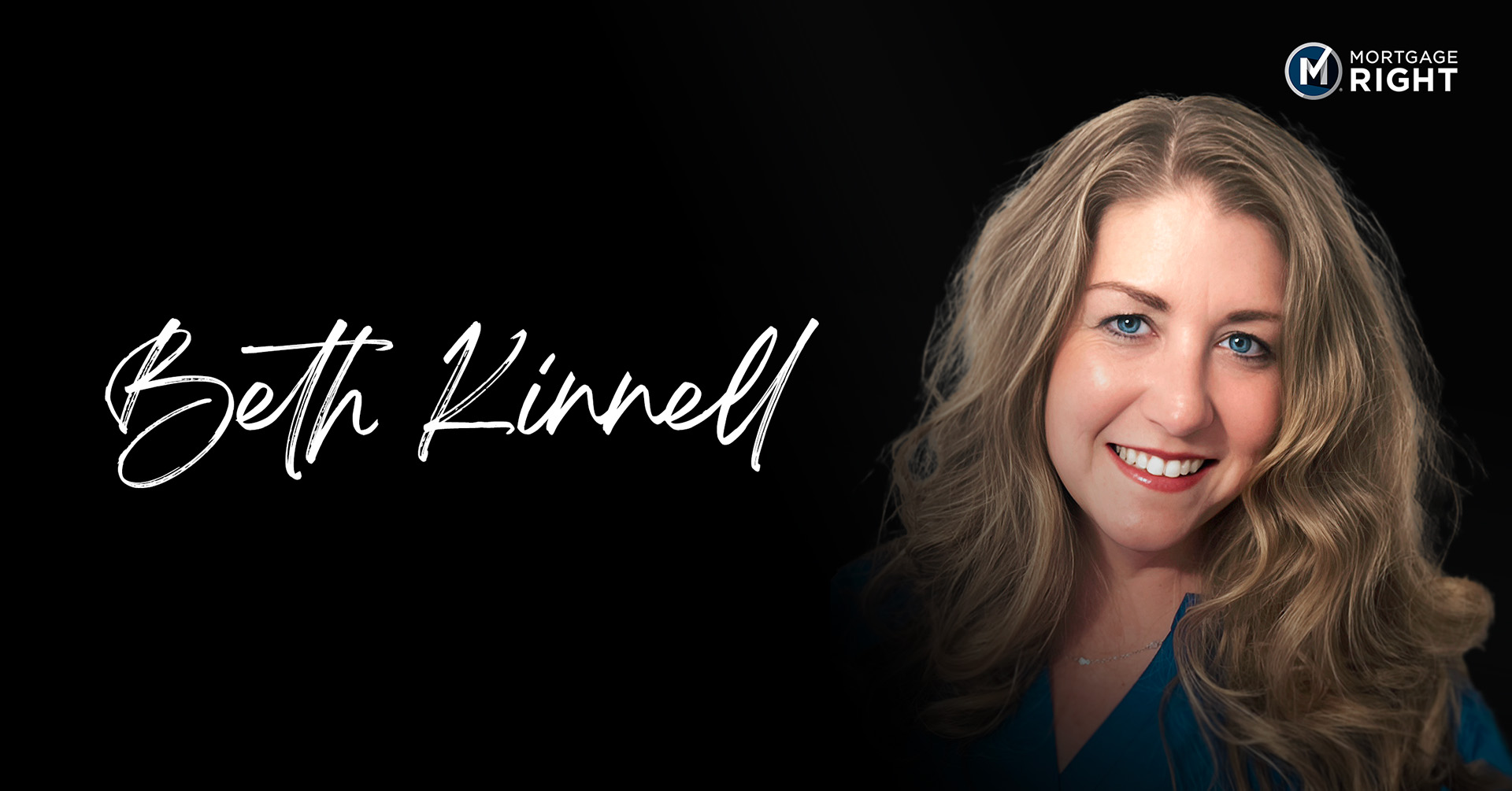Transitioning into Branch Management: A Q&A With Mortgage Industry Expert Beth Kinnell

In this article
- Beth Has Seen Mortgages From Every Angle
- Facilitating the Best of Both Worlds
- The Goldilocks Factor
- What Happens to My Pipeline When I Move?
- What About My Awesome Team?
- You Don’t Have to Start from Scratch
- How Do I Leave My Current Job?
- A Product Mix that Meets Real Needs
- Direct Communication Up and Down the Hierarchy
- Making Dreams Come True
Beth Kinnell has helped close mortgages for more than two decades, working in every role at every type of institution possible. With her deep understanding of the industry dynamics and strategies to maximize the average mortgage loan officer salary, she now uses that experience and expertise to help lenders build their own branches through MortgageRight.
Beth Has Seen Mortgages From Every Angle
JB: Give us your background in the industry, and tell us a little about the different routes you can take as a lender.
Beth: So I’ve been in the business since 1999—a long time. I’m dating myself, but there you go. So, I’ve done everything from big banks and small banks to direct lending. I ran a broker shop and that kind of thing, too.
The difference between a lot of these is where you get your business from, how the process works, and the ease of actually doing it.
Your big banks — they have some great stuff to offer. But, you end up with a lot of upper management and a lot of red tape to go through — and a lot of hard and fast rules. And brokers don’t have the same resources a bank lender has.
Facilitating the Best of Both Worlds
Beth: So the great thing about MortgageRight is that you kind of have the best of both worlds. You get to run your own shop, you get to make your own decisions, but you don’t have to worry about all those different levels of running your own shop. You’ve got departments that can handle all that.
JB: Correct me if I’m setting this up wrong, but is one of the benefits of retail getting your own storefront, computers, the whole system? And then one of the benefits of a brokerage is, you can do whatever you want, right? But brokerage doesn’t necessarily have the infrastructure. They have to shop each loan and set up their phone systems and all that.
Beth: Absolutely. At MortgageRight, we say it’s your shop, you run it the way you want to, of course, within compliance. But you really do. You get to make those decisions. You get to dictate what you pay your staff and what you pay yourself.
But then you also have an IT department, so when your computer is going kablooey, then you can call someone to help. We’ve got your compliance, your marketing, that kind of thing. So you have the best of both worlds. You run your branch the way you want to, but you also have the support that’s already in place, and we’ve already figured out how to do all the other tedious stuff, so you don’t have to figure that part out.
You don’t have to figure out what you can say in an ad. You don’t have to figure out what your website is going to have to look like.
The Goldilocks Factor
JB: When you encounter people In business who are kind and have good prices, it feels unreal. Why do you y’all do it this way, offering so much support and freedom when you don’t have to?
Beth: It’s very cliche to say, but it’s not like other mortgage loan officer jobs. Everybody really is like family. When we bring in new people to interview, it’s not this big roll-out-the-red-carpet dog-and-pony show. We’re pretty much who we are.
We are small enough and big enough.
Small enough to still be close-knit. When you come on to MortgageRight, you can call anybody in the company and ask a question. There’s nobody who’s off limits.
They listen, and I think the biggest thing is that they listen to your ideas and suggestions.
A good example is, when the industry exploded during COVID, we said, “Wait a second, our turn times are getting ugly.” We went from 24 hours to, well more than 24 hours. So we came together and said, “Okay, what can we do differently? What can we change? What can we make better?”
And guess what? We did it. We implemented a whole new process, and it’s working great. We don’t just have these hard and fast rules that we can never change. You’ve seen how fast things change in this industry. We have to be able to adapt.
What Happens to My Pipeline When I Move?
JB: All right. So let’s say I’m convinced. I want the best of both worlds. I’m working for a bank, or I’m working for a retail branch, and I’ve got 50 loans in my pipeline. I have a brand new box of business cards. My boss is stressing me out, but we’re friends. What do I do?
Beth: The biggest thing is, once everybody’s kind of made the decision and decided that this is a good fit for everybody, let’s go ahead and jump.
It’s ultimately the borrower’s decision which mortgage company they want to go to. But in my experience, they want to do business with Beth Kinnell, not the lending institution. I think it’s because they trust me. They’ve done business with me. To be honest, they really don’t care what my card says.
You simply let them know, “I’m going to let you know I’m going to be transitioning to a new company, blah, blah, blah, blah, blah. This is the reason why I’m doing it, etc.”
They can make that decision from there.
We obviously cannot take loans that are currently owned by another bank, even if they are the branch manager’s personal referrals. So we can’t take any loans that are currently in the pipeline at another bank.
But any new business can be given the option to come to MortgageRight. And we’ll help you make sure all of your clients are taken care of either way.
And then, once we set a start date, we’ll prepare for that by building your website, working on their landing pages, ordering computers, setting up passwords and all that kind of stuff.
JB: I know when many people want to switch out of mortgage loan officer jobs and make it on their own, there can be a delay in licensing. How fast does that work?
Beth: The day a lender decides to start, our licensing department picks up their sponsorship from their current employer. Typically, if we can do that in one day, it gets approved the same day.
What About My Awesome Team?
JB: Let’s say you have a team you really like at your bank or retail branch. What can you do with that?
Beth: Let’s say the branch manager has a processor. They’ve got several loan officers. They’ve got a business manager.
When everybody decides that they’re on board and want to move forward, we start working on applications and background checks for your team. It’s really pretty simple, honestly. Then we set the start date and kind of do the same thing with them.
Our processing lead trains all of our processors because we do things a little bit differently. So we train them for a week.
You Don’t Have to Start from Scratch
JB: What happens on the first day?
Beth: The day they start, it’s getting your passwords set up, business cards, and all that jazz. On the second day, I’ll do a call with them and pretty much take them through a loan from start to finish in our system.
We handhold everyone until they’re comfortable with the process. Typically, in three to six months, they call me less and start figuring everything out on their own.
How Do I Leave My Current Job?
Beth: There’s not really ever a great way to leave mortgage loan officer jobs, especially if you’re a good producer. Let’s be honest. They’re not going to want you to leave.
But I don’t worry as much about the current employer as I do my referral partners—your realtor, your agent, your closing attorneys, that kind of thing. Just be honest and tell them you found a great opportunity, and this is going to be so much better for them and their clients.
A Product Mix that Meets Real Needs
Beth: LOs come here because our in-house culture, service, and everything is amazing, but they can stay here because of the wide array of products and services that we offer for their clients.
Our back office and owners are constantly looking for the best lending capabilities to make sure that we can actually sell more loans.
Our lenders can be a one-stop shop for any need or niche.
Direct Communication Up and Down the Hierarchy
JB: How important is it to y’all in the main office there to give real yeses and real nos?
Beth: 100%. I’m going to be on the phone with you every day for the first three to six months, so I’m not going to blow smoke, you know what I mean? When you’re at the corporate visit, and you’re kicking the tires, or whatever you want to call it, I’m not going to tell you anything that’s not true.
Again, we aren’t like other mortgage loan officer jobs. We want you to say long-term, to retire here. And you can’t do that unless you’re given actual, legit answers.
Otherwise, they’ll lose trust, which will lead to a bad fit for us and cause a lot more problems. So our goal is not to get as many branches as we can possibly get in. It’s really to bring branches in where they are a good fit with the same mindset.
Companies will tell good lenders anything to get them in the door, but it’s just not worth it. It takes a lot of time, money, and energy to bring a new branch in. I don’t want to do that just to have them leave in three months because we weren’t truthful.
Making Dreams Come True
JB: So y’all aren’t building the infrastructure to bring on branches in bulk. You’re building the infrastructure to help good lenders close good loans.
Beth: Exactly. And to have an actual branch that we’re proud of. If it’s doing well and it’s happy, that’s a good testament.
We’re all here for a common goal: getting our clients into a beautiful home. So that’s the goal.
Looking for better mortgage loan officer jobs? Click here to take the next step in your career with MortgageRight.

